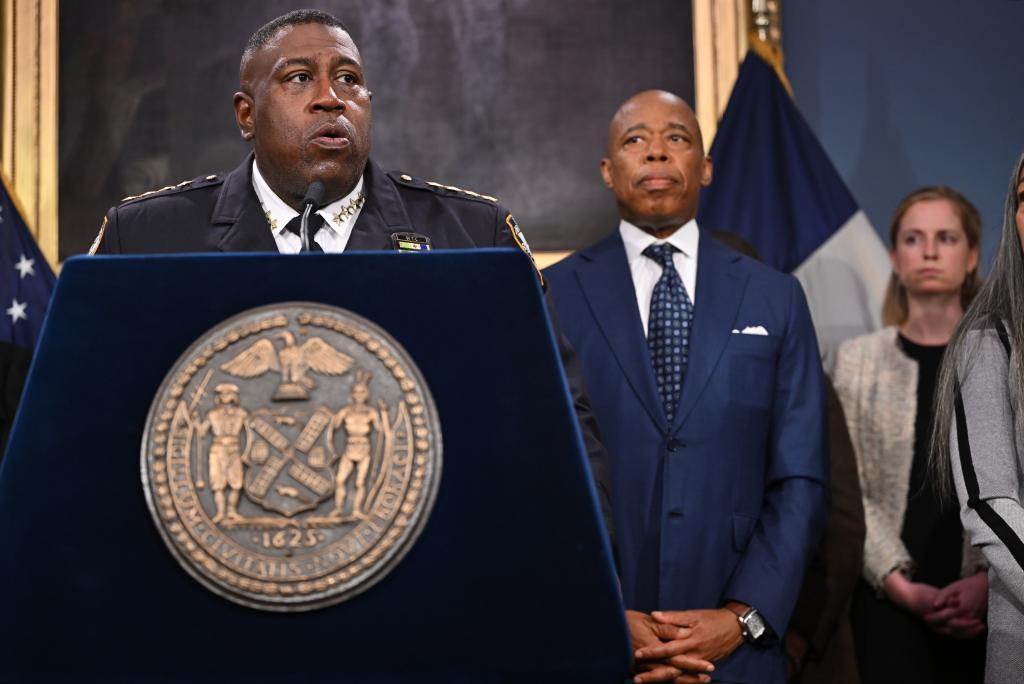The New York City Police Department (NYPD) has been rocked by a scandal involving former Chief of Department Jeffrey Maddrey, its highest-ranking uniformed officer. Authorities raided Maddrey’s Queens residence early Thursday morning as part of an investigation into allegations of sexual misconduct. The investigation, spearheaded by the NYPD’s Internal Affairs Bureau in collaboration with other law enforcement agencies, centers on claims that Maddrey engaged in a quid pro quo relationship with a subordinate, trading sexual favors for overtime opportunities. Following the execution of search warrants at multiple locations, including Maddrey’s home, NYPD Commissioner Jessica Tisch announced his suspension from the department.
The allegations against Maddrey stem from a complaint filed with the federal Equal Employment Opportunity Commission (EEOC) by Lieutenant Quathisha Epps, who served under Maddrey in an administrative capacity. Epps alleges that Maddrey, exploiting his position of power, coerced her into performing unwanted sexual favors in exchange for substantial overtime assignments. Payroll data reveals Epps as the NYPD’s highest earner in fiscal year 2024, amassing over $400,000, with more than half attributed to overtime pay. This revelation further fuels suspicions of impropriety and strengthens the basis for the ongoing investigation.
Maddrey, prior to his suspension and the subsequent raids, had abruptly resigned from the NYPD in late October. This resignation followed an exposé by a news outlet that brought the allegations to light. While acknowledging a “consensual, adult relationship” with Epps, Maddrey vehemently denied the claims of coercion and exploitation. His attorney, Lambros Lambrou, characterized Epps’s allegations as a deflection tactic, suggesting she was attempting to shift blame away from her own potential misconduct.
The unfolding scandal has raised serious concerns about abuse of power and ethical breaches within the NYPD. The investigation not only focuses on the alleged quid pro quo sexual harassment but also scrutinizes the exorbitant amounts of overtime accrued by Epps. The disparity between her base salary and overtime earnings raises questions about the department’s oversight of overtime allocation and potential systemic vulnerabilities to exploitation. The probe aims to determine whether Maddrey used his authority to manipulate overtime assignments for personal gain and whether other individuals within the department were complicit in or aware of the alleged misconduct.
The raids on Maddrey’s residence and other locations signal an intensification of the investigation. Investigators are likely seeking evidence to corroborate Epps’s claims, including communication records, financial documents, and any other materials that may shed light on the nature of the relationship between Maddrey and Epps. The outcome of the investigation could have significant ramifications for the NYPD, potentially leading to further disciplinary actions, policy changes, and a renewed focus on ethical conduct within the force. Furthermore, the investigation could trigger a broader review of overtime practices within the department to prevent future instances of abuse.
The allegations against Maddrey represent a serious breach of public trust and cast a shadow over the NYPD’s integrity. The investigation, its findings, and subsequent actions taken by the department will be closely scrutinized by the public and will significantly impact the department’s efforts to maintain its credibility and public confidence. The case underscores the critical importance of accountability and transparency within law enforcement agencies and the need for robust mechanisms to prevent and address instances of abuse of power and sexual misconduct. The outcome of this investigation will undoubtedly shape the future of the NYPD and serve as a crucial test of its commitment to ethical conduct and just practices.

